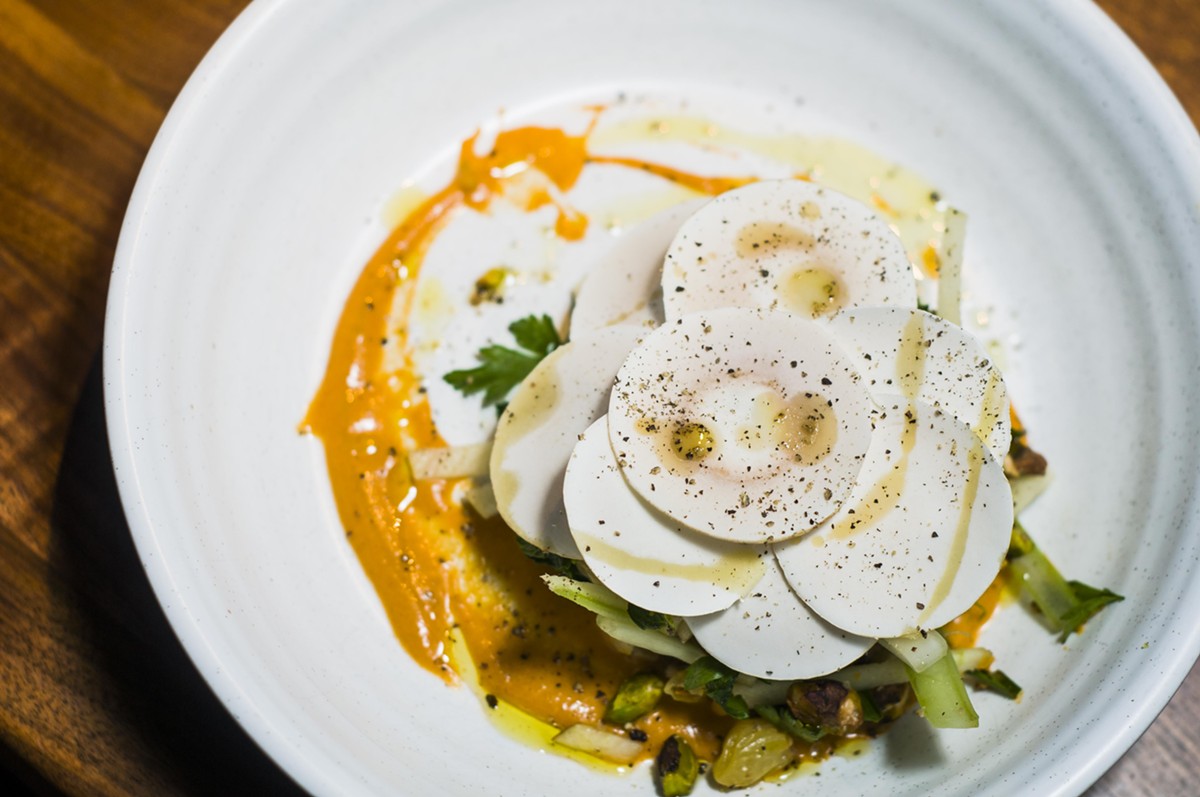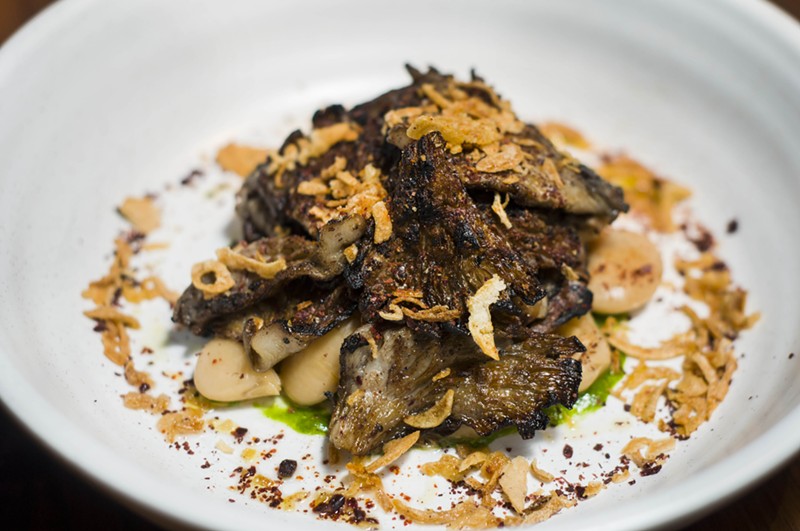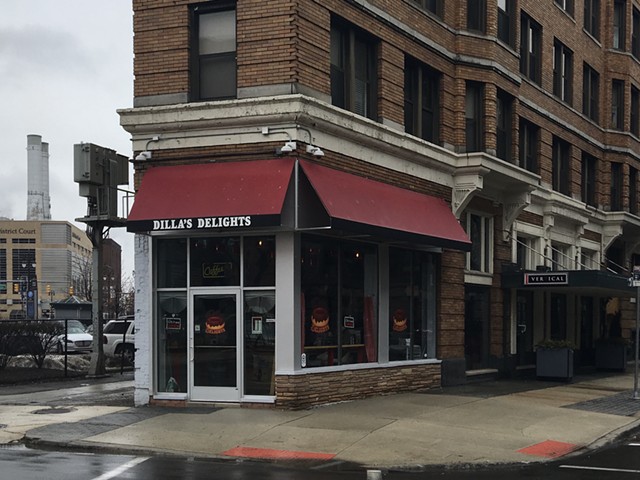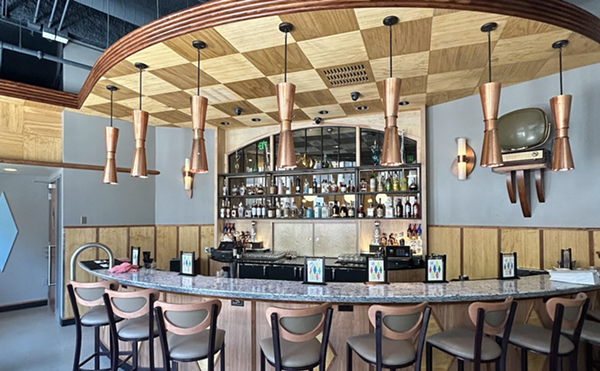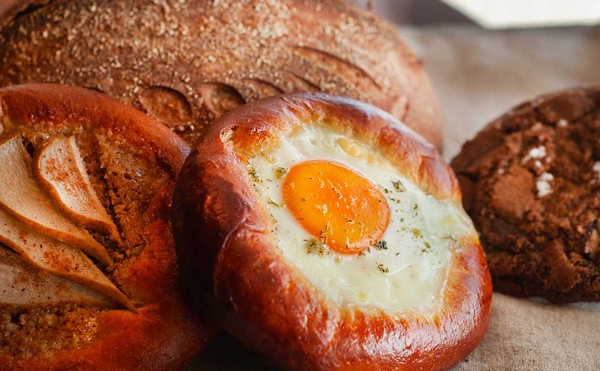"A little piece of non-Detroit in the heart of Detroit," riffed a dinner companion at Magnet. "Could anyone living within a quarter mile of here afford to eat here?"
When the cheapest way to order is the Chef's Selection at $60 a head, and yet the owners call the place "a simple new restaurant," there's a disconnect. Press materials say "MAGNET is reminiscent of an era before grand tales of Detroit's comeback," but the opposite is true: if any restaurant is more emblematic of this decade's gentrification, I have yet to visit it.
Which is not to say that it's a new thing to have a fancy restaurant in a low-income area like Core City, and count on all your traffic coming from miles away. El Barzon has been doing it for years in Southwest Detroit, providing a guard in the parking lot for nervous suburbanites (Magnet has a guard, too). Before that, in the 1970s, Giovanni's began serving high-end Italian in a blighted area truly on the wrong side of the tracks — and lo and behold, Frank Sinatra hosted a private party in the back room.
Magnet beverage director Drew Pompa says the idea of opening Magnet in "a corner of the city that isn't a popular destination" is that guests "have to go a little outside of their comfort zone. ... It's an adventure to drive 20 miles to come to Magnet."
So owners Brad Greenhill and Philip Kafka bought an old radiator shop, kept the name, and gussied it up for the cool kids. They've made it pretty, with a sunken bar lined with red and white neon, an open kitchen the width of the restaurant, linen napkins, and big windows on a lovely brick courtyard.
What's really cool is the no-tipping policy, with Magnet opting to pay workers a living wage — what a concept — rather than Michigan's princely tipped minimum of $3.59 an hour. So you can think of that $60 tariff as $50 plus tip. Wine from all over — Hungary, Portugal, Lebanon, Uruguay, lots of France, and Italy — is $46-$170 per bottle, $11-$14 by the glass, and cocktails are $14 — but call it $11.66.
Once you've decided to splurge on this non-simple spot, you'll be treated to a vast array of mostly vegetable dishes, many of them cooked on a wood-fired grill, no simple feat. The chef selected 16 of them for our party, including three desserts. The flavors made restraint impossible, and at the end I felt as stuffed as Thanksgiving, minus the family drama.
Our first eight dishes, "Beginnings," were brought all at once. Chef Greenhill is into flatbreads, and our party of four loved the flaky laffa, which I would call a cross between pita and naan, in texture if not in recipe. The dough is similar to pita dough, but includes fermented barley flour. Two rounds were used to scoop up creamy hummus and some toasted chickpeas, and a slightly tangy house-made farmer's cheese.
Our favorite for this mega-course was the odd-sounding but delightful blistered corn with blueberries, pistachios, and crisp chickpea noodles in vinaigrette — sweetish and crunchy. Roasted carrots and broccoli both had some heat in the spicing, with mint and a tart glaze adding to the carrots (which could've stayed on the fire longer) and cumin for the broccoli. Beets were another favorite, shaved very thin and served with a tahini-avocado sauce. As we expect from roasted vegetables, every flavor was bright and shining.
The ninth dish, from the "Middle" portion of the menu, was lamb bread. For just one example of the lengths Greenhill goes to, to make us happy: he mixes minced lamb shoulder with tomato paste, cumin, chilies, and onion. That's spread on the flatbread and baked, and then some grated smoked lamb heart is sprinkled on.
Also in this wave, a plain roasted cauliflower was blackened, too much, and served with salsa verde and a lemony crème fraiche.
Best of all were smoky oyster mushrooms in a koji stock. A fungus-lover like me would go back just for this dish, if it weren't $22 a la carte. Koji, a traditional Japanese ingredient, is a mold that grows on cooked grains, converting them to sugar, and then is added to another product, often soybeans, to ferment some more (it's the process behind miso, sake, and soy sauce). The result is enough umami to make meat entirely unnecessary.
Magnet does serve animal protein, in most of the "End" dishes: a whole branzino, "red chicken," which you can watch roasting in the open kitchen, or a $52 beef shank. Our chef chose the fish and, though by that time we were a bit jaded, it was quite creditable, with blistered skin and preserved lemons. It was served with some fabulous potatoes in two sauces, peperonata and smoked toum. Smoke is always available in the Magnet kitchen. And get this — this is the 13th dish of the meal, and Greenhill is still pouring it on — the potatoes are topped with egg yolks that have been cured in salt and sugar, dried, smoked, and grated. Just in case you weren't getting enough flavor in your food already. "Simple," my ass. And fabulous.
The true "ends" were a chocolate and tahini mousse with almond milk, of which coconut was a main flavor, served in stemmed glasses; a moist date cake; and a big slice of lemon pie with unsweetened whipped cream. All were superb contributions to that Thanksgiving feeling.
Pompa touts his house amaro, a digestif, as a good pairing with the chocolate mousse. He makes the amaro by infusing citrus peel, barks, roots, spices, wormwood, and gentian in high-proof spirits for 30 days, adding sugar, and ageing the liqueur in a whisky barrel for another month, going for "big bitterness."
Pompa says many guests comment on how fairly priced his wines are. "Despite what some may experience as sticker shock," he says, "you can still get a lamb flatbread and a couple of vegetables and a bottle of wine with another person, and with tip included you can leave well under $100." This works if you order one of the most popular (and cheapest) wines, a $46 "palate-cleansing" Greek white.
"We're taking unpopular varietals, and we can sell them to the public and draw connections with some other grape a guest might be familiar with," says Pompa, "and they take the so-called risk to try something new. Greater risk, the greater reward."
So many restaurants, so little time. Sign up for our weekly food newsletter delivered every Friday morning for the latest Detroit dining news.

